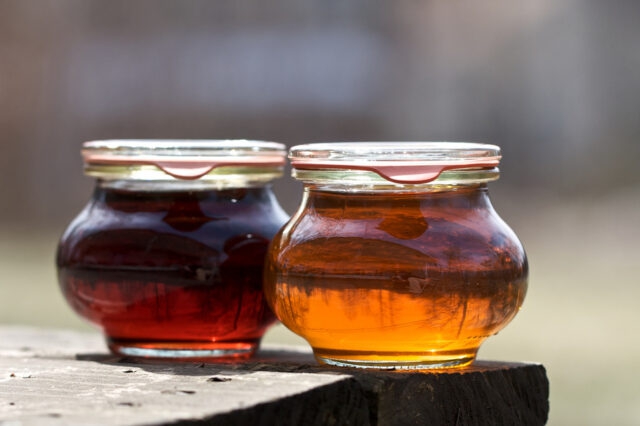Honey and maple syrup are two of the most famous sugar substitutes in the world, and there is no doubt that they are better than cane sugar, but which one of both is the right choice? Both are organic sources of carbohydrates, vitamins and minerals. The medical benefits of pure maple syrup include a strong immune system and a healthy heart. It also has antioxidant effects that safeguard the body against free radicals.
Multiple natural sweeteners are usually selected instead of artificially prepared sugar. More people tend to use honey rather than other organic products of the same kind. However, because of its low-calorie content, maple syrup is known to be a safer choice as compared to honey. You can also look for the best maple syrup Canada. The best maple syrup that you can get. Let’s discuss their specific nutritional properties and the impact they lay on people’s health.
What is Maple Syrup?
Maple syrup is formulated from the sugary syrup of the maple tree. Procedures require scratching or piercing branches to extract this sap. These trees ingest starch in their trunks and roots, particularly in the time preceding the winter. The lengthy accumulation of this starch makes it more difficult to turn it from its original form to sugar. And during spring season, sugar grows and is mixed with water to create a sap that is ready to collect or harvest.
What is Honey
Normally, honey is produced by foraging bees, and also by insects of related species. Bees in general produce honey to be used in winter or in periods of scarcity. Next the bees, with the aid of their long tubular mouthpiece, collect the nectar in a liquid state from the flowering plants and deposit it in their additional stomach, often labeled as “crop.” In the bee’s stomach, the nectar alters the composition, blending with enzymes that alter the storage time and structure of the honey. Restoring to the beehive, the honeybees transfer the honey towards the next bee, regurgitating in the mouths of the other bee. This carries on until the kid hits the honeycomb. Ultimately, the bees pump air in the honeycomb with the help of their wings to evaporate water and compact the honey, and then to seal the honeycomb with the beeswax. (1). The flavor and consistency of the honey can vary based on the species of flowers from which the nectar has been obtained.
Things to consider:
Depending on the storage environments, honey may change its color and texture, often crystal-clear. These are normal shifts, though, and do not mean that the honey has expired. Honey has no expiry date (4).
Maple syrup is more vulnerable to rising mold because of its density. You can hold an unopened bottle of maple syrup forever, but you can use it for around a year after you open it. Unopened bottles of maple syrup can be stored in a dry, cool place after opening, and storage in a refrigerator is recommended.
Nutrition:
One portion or one tablespoon of honey is equivalent to 21g of honey, while one portion of maple syrup is one quarter of a tablespoon equal to 83g. Honey has more calories, carbohydrates and proteins, including both sugar and fiber , but it does not produce fat. However, Maple syrup has a small volume of fat. Both supplements do not contain cholesterol.
The glycemic index of the maple syrup is smaller than that of the honey. Honey is the best option for a reduced fat diet, while maple syrup is the correct option for low calories, low carbohydrates and low glycemic index intakes.
Vitamins
Honey is enriched in vitamin B3, vitamins B5 and B6 and also incorporates vitamin C, though maple syrup is not. Alternatively, there is a vitamin in maple syrup that is not found in honey: vitamin B1. Maple syrup is richer in vitamin B2 as well. Both diets lack vitamin A, vitamin E, vitamin D, vitamin K, vitamin B9 and vitamin B12.
Minerals:
Honey is more abundant in copper, phosphorus and iron.Maple syrup, on the other side, provides more calcium, zinc, potassium and magnesium. However, Honey has a lower sodium content.
Restrictions:
Honey can produce bacteria that may cause infant botulism, therefore children under 12 months of age should not be allowed to eat honey. It is safe for kids with one year of age or older (27).
It is also recommended that the intake of honey should be reduced to 6 tablespoons (25 grams) per day for women and 9 tablespoons (38 grams) for males due to high sugar levels (28) (28). And it is also safer to avoid giving maple syrup to babies and infants because of the high concentration of sugar.
Bottom Line
In short, pure maple syrup and honey are better alternatives as sugar substitutes rather than processed sugars. Honey contains more sugars, proteins and calories, whereas maple syrup includes more fats. Honey’s glycemic index is higher. It is stronger in vitamins C, B3, B5 and B6, while maple syrup is richer in vitamins B1 and B2. Honey has high levels of iron, phosphorus and copper, but maple syrup has higher levels of calcium, magnesium, zinc and potassium. Honey has a lower sodium content.
Honey and maple syrup convey certain anti-diabetic, cardio-protective, and anti-cancer properties due to several antioxidant compounds. However it is still essential to moderate the consumption of all high-sugar packaged foods, including maple syrup and honey.
Also read about:
The Best Agency For Developing Net And E commerce stores
Make Your Room More Attractive By Adding Different Fine Art as Interior
Buy instant Instagram likes for the benefits of your business marketing










